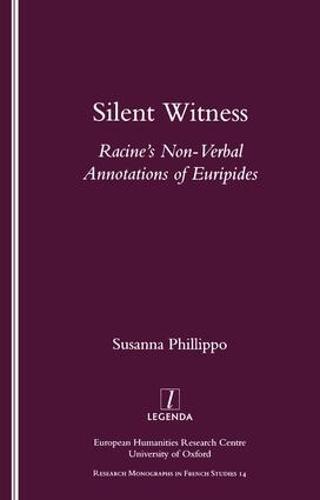Overview
This is an examination of the influence of the plays of Euripides on the French tragedian Racine, gleaned from Racine's markings on the texts. In her study, Phillippo examines the way in which the creative processes linking the two writers may have worked. She concentrates on the largely unexplored evidence supplied by ""non-verbal"" aspects of the annotations: the markings of lines and passages by underlining, brackets, etc. Such markings suggest how Racine probably understood the Greek ""originals"", and reveal the qualities of the Greek dramatist to which the French writer appears to have responded.
Full Product Details
Author: Susanna Phillippo
Publisher: Taylor & Francis Ltd
Imprint: Legenda
Edition: Annotated edition
Volume: No. 14
Dimensions:
Width: 15.20cm
, Height: 1.30cm
, Length: 22.90cm
Weight: 0.340kg
ISBN: 9781900755610
ISBN 10: 1900755610
Pages: 232
Publication Date: 01 December 2003
Audience:
College/higher education
,
Professional and scholarly
,
Undergraduate
,
Postgraduate, Research & Scholarly
Format: Paperback
Publisher's Status: Active
Availability: In Print

This item will be ordered in for you from one of our suppliers. Upon receipt, we will promptly dispatch it out to you. For in store availability, please contact us.
Reviews
For anyone interested in Euripides and his influence, the research and the arguement here presented offer much to tantalize.--Clara Shaw Hardy, Carleton College The Classical Bulletin, 81 (1), 2005 It is true that we will never know why Racine marked certain passages, and that we can also argue for the influence of text that is unmarked. The study of sources will necessarily often belong to the domain of informed speculation. But if we accept that literary criticism deals more in persuasion than in certainties, we will be more sympathetic to this well-judged attempt to look at an old question in what is an original, clear-headed, and stimulating way.--John Campbell Modern Language Review, 100.2, April 2005, 500-01 Phillippo ... is to be congratulated on finding interest in such apparently unpromising markings and on giving them voice. Indeed, her book is a triumph of sober scholarship and critical imagination.--Michael Hawcroft French Studies, LVIII.3, 2004, 408-9 Phillippo s conclusions remain firmly within the limits of what can reasonably be deduced from the evidence and the complete listing in an appendix of Racine s non-verbal annotations allow the sceptic to check against the original Euripidean text. This book has added an important element to the study of Racine s work.--Mark Bannister International Journal of the Classical Tradition, Fall 2004, 312-13 Source criticism seems to have caught a second wind lately ... Silent Witness represents an enlightened form of this methodological approach, giving an inside view of Racine s creative process that allows us to look over his shoulder in the atelier d artiste.--Ronald W. Tobin L'Esprit Createur, Vol. XLIV, n. 2, Summer 2004, 97-8 This book has been painstakingly researched and set out in a manner to facilitate the reader s understanding of the detailed argument based on close reading of the French and Greek texts.--Rosemary Arnoux The New Zealand Journal of French Studies, 25/1, 2004, 61-2
For anyone interested in Euripides and his influence, the research and the arguement here presented offer much to tantalize.--Clara Shaw Hardy, Carleton College The Classical Bulletin, 81 (1), 2005 Source criticism seems to have caught a second wind lately ... Silent Witness represents an enlightened form of this methodological approach, giving an inside view of Racine s creative process that allows us to look over his shoulder in the atelier d artiste.--Ronald W. Tobin L'Esprit Createur, Vol. XLIV, n. 2, Summer 2004, 97-8 This book has been painstakingly researched and set out in a manner to facilitate the reader s understanding of the detailed argument based on close reading of the French and Greek texts.--Rosemary Arnoux The New Zealand Journal of French Studies, 25/1, 2004, 61-2 It is true that we will never know why Racine marked certain passages, and that we can also argue for the influence of text that is unmarked. The study of sources will necessarily often belong to the domain of informed speculation. But if we accept that literary criticism deals more in persuasion than in certainties, we will be more sympathetic to this well-judged attempt to look at an old question in what is an original, clear-headed, and stimulating way.--John Campbell Modern Language Review, 100.2, April 2005, 500-01 Phillippo s conclusions remain firmly within the limits of what can reasonably be deduced from the evidence and the complete listing in an appendix of Racine s non-verbal annotations allow the sceptic to check against the original Euripidean text. This book has added an important element to the study of Racine s work.--Mark Bannister International Journal of the Classical Tradition, Fall 2004, 312-13 Phillippo ... is to be congratulated on finding interest in such apparently unpromising markings and on giving them voice. Indeed, her book is a triumph of sober scholarship and critical imagination.--Michael Hawcroft French Studies, LVIII.3, 2004, 408-9
Phillippo s conclusions remain firmly within the limits of what can reasonably be deduced from the evidence and the complete listing in an appendix of Racine s non-verbal annotations allow the sceptic to check against the original Euripidean text. This book has added an important element to the study of Racine s work.--Mark Bannister International Journal of the Classical Tradition (01/01/0001)



